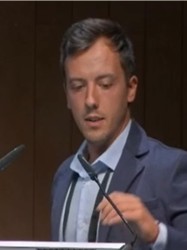Summary
Francesco Mazzarotto is a Honorary Research Fellow of the National Heart and Lung Institute, member of the Cardiovascular Genetics and Genomics group (cvgenetics.org) led by James Ware, Paul Barton and Stuart Cook. His primary position is that of Lecturer in Medical Genetics at the Department of Molecular and Translational Medicine of the University of Brescia (Italy). He also currently works as a bioinformatics freelance worker for a private cancer research institute (Fondazione Edo ed Elvo Tempia (Biella, Italy)).
Francesco's research at Imperial is centered on utilizing bioinformatics approaches to understand the genetic architecture of cardiomyopathies and other cardiovascular diseases, such as arrhythmogenic conditions associated with the risk of sudden death. More specifically, his current research is focused on detecting genes associated with such conditions analysing cohorts and families, on developing algorithms aiding the identification of pathogenic genetic variants and contributing to a refinement of current variant interpretation approaches. Moreover, Francesco recently expanded into the psychiatry genetics field, by virtue of his recently awarded position at the University of Brescia, where he investigates the genetic basis of conditions such as schizophrenia and major depressive disorder.
Francesco's background is mixed between biology and bioinformatics. He obtained a BSc in Biology (2010) and a MSc in Bioinformatics (2012) from the University of Bologna, the latter including development of his MSc thesis at the Institute of Biomedical Technology in Tampere (Finland, now BioMediTech). Subsequently, Francesco underwent a PhD programme in Clinical Medicine Research at Imperial College London (2012-2016) within a EU-funded Marie Curie training network (CardioNeT), under the supervision of Stuart Cook and Paul Barton.
Selected Publications
Journal Articles
Mazzarotto F, Olivotto I, Boschi B, et al., 2020, Contemporary insights into the genetics of hypertrophic cardiomyopathy: towards a new era in clinical testing?, Journal of the American Heart Association, Vol:21, ISSN:2047-9980, Pages:1-22
Mazzarotto F, Olivotto I, Walsh R, 2020, Advantages and perils of clinical whole-exome and whole-genome sequencing in cardiomyopathy., Cardiovascular Drugs and Therapy, Vol:34, ISSN:0920-3206, Pages:241-253
Mazzarotto F, Tayal U, Buchan RJ, et al., 2020, Reevaluating the Genetic Contribution of Monogenic Dilated Cardiomyopathy, Circulation, Vol:141, ISSN:0009-7322, Pages:387-398
Mazzarotto F, Girolami F, Boschi B, et al., 2019, Defining the diagnostic effectiveness of genes for inclusion in panels: the experience of two decades of genetic testing for hypertrophic cardiomyopathy at a single center, Genetics in Medicine, Vol:21, ISSN:1098-3600, Pages:284-292
Walsh R, Mazzarotto F, Whiffin N, et al., 2019, Quantitative approaches to variant classification increase the yield and precision of genetic testing in Mendelian diseases: The case of hypertrophic cardiomyopathy, Genome Medicine, Vol:11, ISSN:1756-994X
Schafer S, de Marvao A, Adami E, et al., 2017, Titin-truncating variants affect heart function in disease cohorts and the general population, Nature Genetics, Vol:49, ISSN:1546-1718, Pages:46-53
Walsh R, Thomson KL, Ware JS, et al., 2016, Reassessment of Mendelian gene pathogenicity using 7,855 cardiomyopathy cases and 60,706 reference samples, Genetics in Medicine, Vol:19, ISSN:1530-0366, Pages:192-203
Ware JS, Li J, Mazaika E, et al., 2016, Shared genetic etiology of peripartum and dilated cardiomyopathies, New England Journal of Medicine, Vol:374, ISSN:1533-4406, Pages:233-241
Roberts AM, Ware JS, Herman DS, et al., 2015, Integrated allelic, transcriptional, and phenomic dissection of the cardiac effects of titin truncations in health and disease, Science Translational Medicine, Vol:7, ISSN:1946-6234, Pages:270ra6-270ra6

